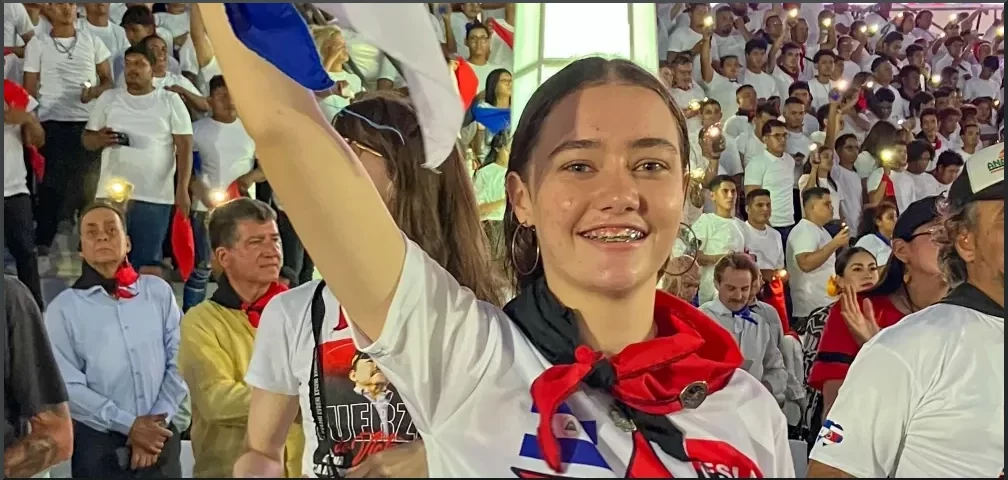by Roger Harris, published on Internationalist 360°, July 27, 2023
“We are fighting against the Yankee enemy of humanity,” explained Nicaraguan Vice President Rosario Murillo, setting the tone of the 44th anniversary celebration of their revolution.
Later, her husband Daniel Ortega, the country’s president, elaborated in his hour and a half address: “When we use the term Yankee we mean those who have a racist, imperialist attitude, which is not the case with the US people…Indisputably, given the weight of the capitalist system, the weight of the military-industrial complex will bend any president, who despite many promises he makes then comes to occupy the presidency of the US.”
Demonstration of the trust of the president with the people
 I was among the few hundred invited “internationals” along with thousands of Nicaraguans, including a large and spirited youth contingent, who had boarded buses to the Roberto Clemente baseball stadium for the anniversary celebration on July 19.
I was among the few hundred invited “internationals” along with thousands of Nicaraguans, including a large and spirited youth contingent, who had boarded buses to the Roberto Clemente baseball stadium for the anniversary celebration on July 19.
Security was less than at your average convenience store in the States. There were no metal detectors, no checking of IDs, or even searches of backpacks when we arrived. We were seated literally within a stone’s throw of where the political leadership of Nicaragua would sit when they arrived an hour later.
In a demonstration of the trust of the president with the people, at the end of the ceremonies Ortega simply waded out into what amounted to a mosh pit of well-wishers to press the flesh and take selfies (see here at 4:25:59ff).
Then Daniel, as he is affectionately called, left the way he had come, driving his own car. The rest of the people lingered to socialize and celebrate as they had in the days immediately leading to the anniversary. If Nicaragua is a police state, as reported in the US corporate press, it was hardly apparent at this important national event.
Biden visits my neighborhood
In contrast to the popular celebration in Nicaragua, the president of my own country stealthily slipped in and out of my sleepy bedroom community north of San Francisco just a month before. In the days immediately before his visitation, low-flying NORAD fighter jets loudly asserted full spectrum dominance over the hot tubs and manicured lawns of Marin County. Shielded from the public, my president came and went in a massive Osprey military helicopter.
In a quintessentially US-style exercise of democracy, colloquially known as a “fund-raiser” – not to be confused with the crude corruption of so-called banana republics – Joe Biden privately met with a select short list of obscenely wealthy people at an undisclosed location. There they had the opportunity to directly buy influence with the government to perpetuate their privileged positions.
Biden had secured his election in 2020 with a record high $14.4 billion campaign cost, an amount equivalent to Nicaragua’s entire GDP. That money bought 51% of the electorate with a turnout of 67%.
Yet, Biden calls Nicaragua a dictatorship. However, a landslide 76% of the Nicaraguan electorate chose Ortega in their 2021 national election with six freely competing parties and a comparable turnout of 65%, despite US calls for an electoral boycott.
The most recent July poll data for Biden and Ortega reflect their popularity with their respective constituents: 39% approval rating for the US president and 79% for his Nicaraguan counterpart.
Reliving the revolutionary tradition through song
For most of the young Nicaraguan population with a median age of 24 years, the 1979 victory by the Sandinista National Liberation Front (FSLN) over the US-backed Somoza dictatorship was an event of the distant past. The FSLN name commemorates the even older Nicaraguan resistance to the US occupation, led by Augusto César Sandino in the 1930s. But theirs is a popular and ongoing revolution.
As Vice President Rosario Murillo clarified after almost an hour of music, “We have reached this 44/19 [anniversary date] with so much song in our hearts… we are…the original heroes, the warriors who live within us all, the eternal fighters.”
For a good part of the celebration on the 19th, both youth and their 77-year-old former guerilla leader were on their feet reliving the revolutionary tradition by singing the “songs of life and hope” that organically came out of that struggle. President Ortega described how, through music, the singing of the youth forges revolutionary consciousness.
Especially now that the country is recovering from the 2018 failed US-backed coup attempt, the revolutionary tradition is being invigorated with new popular songs as the nation rebuilds and repairs the public hospitals, schools, and municipal facilities that had been attacked.
Ortega’s speech
President Ortega recalled the long history of US intervention and opposition to democracy in Nicaragua. “Reagan stood up,” he recollected, “and even said ‘I am a Contra.’ Nothing strange, logically, that Reagan was a Contra. The strange thing would have been if Reagan had not been a Contra.” The Contras were the US-backed counter-revolutionary terrorists recruited from the remnants of Somoza’s national guard.
Ortega paid tribute to the martyred presidents of Burkina Faso and Libya, Thomas Sankara and Muammar Gaddafi, both of whom had stood in solidarity with the Sandinista cause. The current prime minister of Burkina Faso was the honored international speaker at the celebration.
The stories were retold, and tribute paid to the national heroes and heroines of Nicaragua, starting with the first Indigenous resistance to “Spanish imperialism.” The president further paid tribute to the youth, calling them the “fruit of the Sandinista Revolution” and a “divine treasure.”
Ortega invited two young people from Puerto Rico to the podium. They had earlier given him a baseball with “21” on it, the number that Roberto Clemente wore. Clemente is considered a national hero in Nicaragua. The Puerto Rican baseball player died in a plane crash bringing aid to Nicaragua after a devastating earthquake during the Somoza dictatorship. Ortega also took the opportunity to affirm Puerto Rico’s fight to be free and independent.
Ortega commented on the recent joint meeting of the European Union (EU) with the 33 nations of Latin America and the Caribbean, comprising the regional CELAC organization. He celebrated CELAC’s resistance to the retrograde initiatives of the EU.
The EU failed to get a censure of Russia in the Ukraine conflict. Also, the “Nazi president,” in Ortega’s words, of Ukraine was excluded from the meeting, much to the chagrin of the EU. However, the EU succeeded in vetoing a resolution condemning the US for sending cluster bombs to Ukraine, even though the EU supposedly has banned them.
Ortega concluded: “the solidarity of the peoples is firmly maintained even in the most difficult moments, and we see and feel it every day.”
US considering new sanctions to destabilize Nicaragua
Meanwhile, a bi-partisan bill, co-sponsored by Republican Marco Rubio and Hillary Clinton’s vice presidential running mate Tim Kaine, calls for a new salvo of economic sanctions and psychological warfare to achieve regime-change in Nicaragua.
The Trump administration first sanctioned Nicaragua in 2018. The subsequent US administration has not only renewed, but has extended and intensified the unilateral coercive measures. Once in office, Biden banned importing Nicaraguan gold and sugar, their two largest export commodities.
The new legislation would further stifle trade by Nicaragua with the US, cutting off beef and coffee exports. Likewise, restrictions on access to international financing for development projects, which were already severely limited by the 2021 RENACER Act, would be tightened to try to asphyxiate the economy.
The bill also calls for Nicaragua to repeal its own 2020 foreign agents law, which was patterned after similar US legislation and is designed to protect this small nation from outside interference into its internal affairs.
Most egregiously, Washington claims that Nicaragua poses an extraordinary security threat to the US, when in reality the opposite is the case. Yet in the face of sanctions designed to crush it, Nicaragua defiantly celebrates and continues its revolution.
Roger D. Harris is with the human rights organization Task Force on the Americas, founded in 1985.
